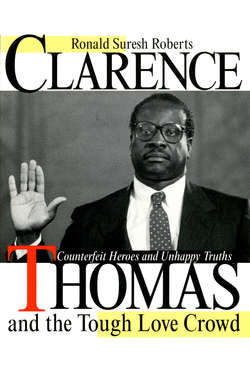Читать книгу Clarence Thomas and the Tough Love Crowd - Ronald Suresh Roberts - Страница 18
На сайте Литреса книга снята с продажи.
The Consequences of Benda’s Ideal
ОглавлениеDespite Benda’s conservative social vision, sustained progressive resistance to his ideal is difficult to find. While Noam Chomsky laudably resists fake claims of objectivity in scholarship, his response is not to abandon the intellectual ideal of somehow-pure truth, but rather to seek it in “far-reaching, deep-seated universal principles of language structure.” This pursuit accounts for an entire school of linguistics to which Chomsky has given his name. And, beyond linguistics, Chomsky’s investigations occasionally unearth questionable political generalizations like the following: “Class transcends race.”8 Ellis Cose’s Rage of a Privileged Class, documenting the persistence of race-related grievance among African America’s successful, suggests the contrary.
Edward Said, too, discussing Julien Benda, understates Benda’s ideological agenda. Said suggests that according to Benda the intellectual’s vocation was “to tell the truth regardless of material consequences.”9 Yet this is a sanguine interpretation. Benda very deliberately pursued the ideal that intellectuals ought to peddle opium to the masses. Moreover, it is entirely possible to oppose lies, as Said wishes to do, without dignifying the notion of an absolute intellectual vocation, ostensibly above civic controversy.
Again, a prominent strand of the critical legal studies movement (henceforth, “Café Crits”)10 also adheres to Benda’s transcendental standard of rationality, despite all the energy the Café Crits spend exposing the question-ableness of institutions and of laws that pose as natural. This loyalty to the tradition of authoritative investigation, which is at the heart of important Café Crit disagreements with Negro Crits,11 is most visible in the “structuralist” strand of Café Crit thought. Café Crits of this variety were convinced, in the midseventies, that they could discern what really makes law tick. They thought they had discovered a universal “fundamental contradiction” in all legal issues. Even after this audacious claim was renounced, the Café Crit search for truth did not disappear but was merely reblended into a supposedly more concrete “phenomenology of being.”
The habit of faith in investigation and truth is a feature of Café Crit thought, well beyond Café Grit’s structuralists and phenomenologists. Roberto Unger believes that fruitful activism requires an overarching “credible theory of social transformation” that the discerning critical scholar produces through brilliant scrivening. Much of Café Crit thought purports to deliver sweaty activists from untutored folly. Peter Gabel, for instance, unabashedly suggests that legal scholarship and political activism must wait upon “a general theory of life.”12 While such Café Crit writing makes wonderful reading, it too often ignores the possibility that political transformation must draw its energy from someplace mundane rather than transcendental.13 Andrew Ross has commented that such ethereal theorizing is about as likely to mobilize change as “the spells of medieval witches or consultations of the IChing.”14
Yet, harrowingly, the suppressed fault line posed by the solitary investigative tradition of Julien Benda remains dimly perceived. Professor Derrick Bell has, for instance, added a preface to the paperback version of his inspirational and far from pessimistic book, Faces at the Bottom of the Well. In this new preface, Bell likens himself to a solitary prophet wandering unheeded in a wilderness. It is clear, both in the context of the book and in light of Bell’s long-standing resistance to rhetorics of impartiality, that he is not advocating anything resembling the ideal of untethered scholarship to which the image of solitary truth bearer that he invokes is usually hitched. Yet Benda’s metaphors are so well entrenched that the model of lonely truth spills as easily from Bell’s pen as it did from Said’s, from Chomsky’s.
This invisible and widespread influence of ideals of disinterest and of solitary truth finding gives unnecessary credence to the Tough Love Crowd’s idea that one can both work within the received ways of the academy and thereby render best political service to one’s community. This paradox—the pursuit of racial justice through relatively raceless models—gives rise to some interesting wrinkles within the Tough Love creed. The Toughs all attempt to contain the varying degrees of race consciousness to which they admit. They assert that racial allegiances, whether inherently unhealthy (Steele) or potentially nurturing (Carter), ought not to enter the practice of the individual’s craft. They assume that race-conscious craft is tainted craft, because the rules of good craft are race neutral. Good craft, they assert, restrains racial and other passions. They are Julien Benda’s progeny.
